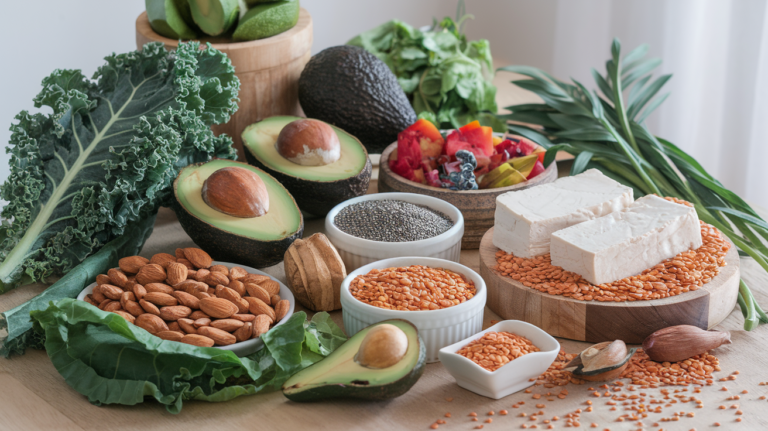Why Alkaline Foods Like Nuts, Seeds, and Plant-Based Proteins Are Essential for Your Diet
In today’s world of fast-paced living and convenience foods, maintaining a balanced and nutrient-rich diet is more important than ever. The alkaline diet has gained popularity for its potential to restore balance in the body by promoting pH neutrality. While the body regulates its pH levels naturally, incorporating alkaline foods into your meals can provide numerous health benefits, such as reducing inflammation, boosting energy, and improving digestion.
Table of Contents
Among the wide variety of alkaline-friendly foods, nuts, seeds, and plant-based proteins stand out for their incredible versatility and nutritional value. These foods not only help support a healthier pH balance but also supply essential nutrients like fiber, healthy fats, and protein—all without the acidity that’s commonly associated with animal-based or processed foods.
Why Focus on Alkaline Nuts, Seeds, and Plant-Based Proteins?
- Nuts like almonds and cashews are packed with healthy fats, calcium, and magnesium, supporting strong bones and heart health.
- Seeds such as chia, flax, and pumpkin seeds are nutrient-dense, providing antioxidants, omega-3s, and minerals that boost immunity and overall well-being.
- Plant-based proteins, including lentils, chickpeas, and tofu, offer high-quality protein and essential nutrients while being low in saturated fats and completely free of cholesterol.
What Are Alkaline Foods?
Understanding the Role of Alkaline Nuts, Seeds, and Proteins in Balancing pH Levels :
Alkaline foods are those that help neutralize acidity in the body, promoting a healthier pH balance. While the human body naturally regulates its pH levels, eating an alkaline diet can support overall health by reducing inflammation, improving digestion, and enhancing energy levels.
Nuts, seeds, and plant-based proteins are excellent additions to an alkaline diet. They not only help balance pH levels but are also packed with essential nutrients like fiber, healthy fats, and plant-based protein.
For more ideas on incorporating alkaline foods into your meals, check out Low-Calorie Lunch Recipes.
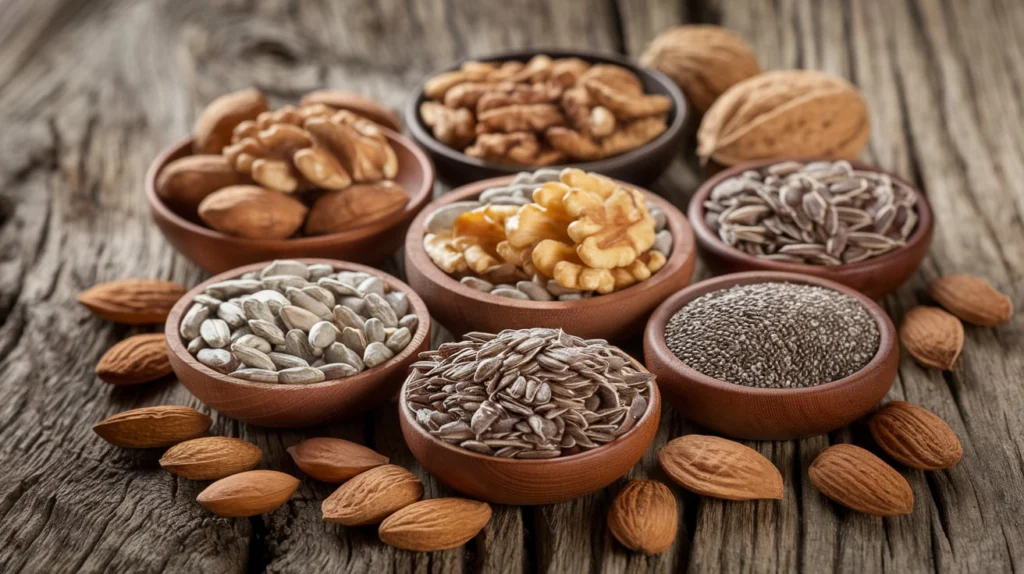
Why Include Alkaline Nuts, Seeds, and Plant-Based Proteins in Your Diet?
These three food groups are powerhouses of nutrition that bring numerous health benefits to the table:
- Nuts provide healthy fats and essential minerals.
- Seeds are rich in antioxidants and omega-3 fatty acids.
- Plant-based proteins offer high-quality protein and fiber without the acidity often associated with animal products.
By including these foods in your diet, you can enjoy a variety of health benefits while reducing your intake of acidic foods like meat and processed snacks.
Benefits of Adding Alkaline Foods to Your Diet
1. How Alkaline Nuts and Seeds Improve Health
Alkaline nuts, seeds, and plant-based proteins are rich in dietary fiber, which aids in digestion and promotes a healthy gut microbiome. For example, flaxseeds and chia seeds are excellent sources of soluble fiber that support regular bowel movements and gut health.
2. Plant-Based Proteins: A Perfect Addition to an Alkaline Lifestyle
These foods are nutrient-dense and provide sustained energy. Almonds, for instance, contain a balance of healthy fats, protein, and carbohydrates, making them a great snack for lasting energy.
3. Reduced Inflammation
Nuts and seeds like walnuts, chia seeds, and flaxseeds are packed with omega-3 fatty acids, which have anti-inflammatory properties. Incorporating these foods into your meals can help reduce inflammation linked to chronic conditions like arthritis.
4. Enhanced Heart Health
The healthy fats in nuts and seeds support cardiovascular health by lowering bad cholesterol levels. Additionally, plant-based proteins like lentils and chickpeas offer nutrients like potassium and magnesium, which help maintain healthy blood pressure.
For meal ideas that support heart health, explore Healthy Lunch Ideas for Weight Loss.
Nutritional Profiles of Alkaline Foods
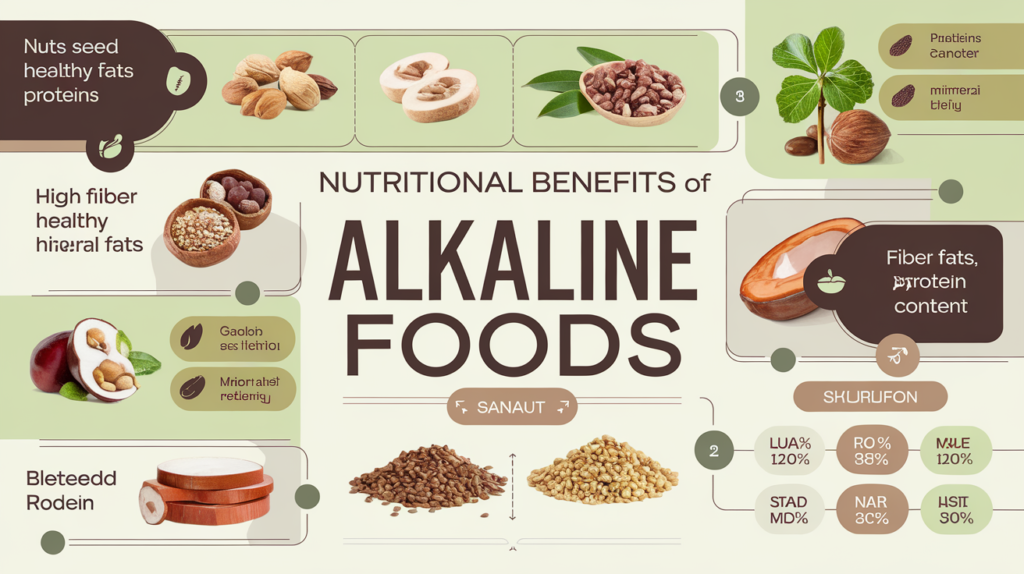
The Alkaline Benefits of Almonds, Cashews, and Other Nuts
- Almonds:
- High in calcium and magnesium.
- Great for bone health and muscle function.
- Cashews:
- Provide healthy fats and iron.
- Ideal for improving energy levels.
Seeds Like Chia and Flax: Small but Mighty Alkaline Boosters
- Chia Seeds:
- Rich in omega-3s and fiber.
- Absorb water to form a gel, making them a great addition to puddings and smoothies.
- Flaxseeds:
- Contain lignans and antioxidants.
- Perfect for heart health and hormone balance.
- Pumpkin Seeds:
- Packed with zinc and protein.
- Excellent for boosting immunity.
Plant-Based Proteins: Alkaline Powerhouses for a Balanced Diet
- Lentils:
- High in protein and iron.
- Easy to incorporate into soups and salads.
- Chickpeas:
- Versatile and rich in fiber.
- Great for hummus, salads, and snacks.
- Tofu:
- A complete protein with calcium.
- Perfect for stir-fries and curries.
For more recipes that feature these ingredients, check out Tasty Vegetable Recipes.
Delicious Recipes Featuring Alkaline Foods
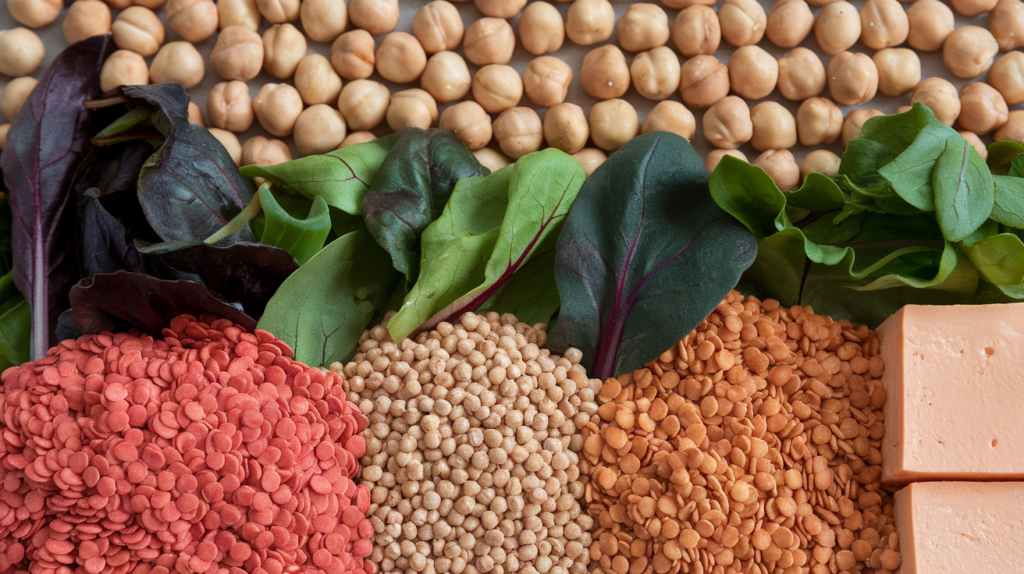
1. Breakfast Recipes with Alkaline Nuts, Seeds, and Proteins
- Chia Seed Pudding with Almond Butter
- Ingredients: Almond milk, chia seeds, almond butter, honey.
- Directions: Mix chia seeds with almond milk and let it sit overnight. Top with almond butter and a drizzle of honey.
- Tofu Scramble with Vegetables and Flaxseeds
- Ingredients: Firm tofu, spinach, bell peppers, flaxseeds.
- Directions: Crumble tofu and sauté with vegetables. Sprinkle flaxseeds before serving.
For more breakfast ideas, visit Easy Healthy Breakfast Recipes.
2. Lunchtime Favorites Using Alkaline Foods
- Spinach and Chickpea Salad with Pumpkin Seeds
- Ingredients: Fresh spinach, cooked chickpeas, roasted pumpkin seeds, lemon vinaigrette.
- Directions: Toss all ingredients together and serve fresh.
- Lentil Soup with Almonds and Herbs
- Ingredients: Lentils, vegetable broth, garlic, chopped almonds.
- Directions: Simmer lentils in broth with garlic. Garnish with almonds and herbs.
3. Creative Dinner Ideas Featuring Plant-Based Proteins and Seeds
- Grilled Tofu with Roasted Vegetables and Cashews
- Ingredients: Firm tofu, zucchini, bell peppers, cashews.
- Directions: Grill tofu and vegetables. Top with roasted cashews for added crunch.
- Quinoa Bowl with Flaxseeds and Chia Seed Dressing
- Ingredients: Cooked quinoa, kale, cherry tomatoes, chia seed dressing.
- Directions: Mix all ingredients and drizzle with chia seed dressing.
For more dinner inspiration, explore Savor Delicious Healthy Meals.
4. Snack and Dessert Recipes with an Alkaline Twist
- Almond and Date Energy Balls
- Ingredients: Almonds, dates, cacao powder.
- Directions: Blend all ingredients and shape into balls.
- Chia and Flaxseed Crackers with Hummus
- Ingredients: Chia seeds, flaxseeds, water, salt.
- Directions: Mix seeds with water, spread on a baking sheet, and bake until crisp. Serve with hummus.
For more dessert ideas, explore Healthy Dessert Recipes.
Practical Tips for Using Alkaline Nuts, Seeds, and Proteins
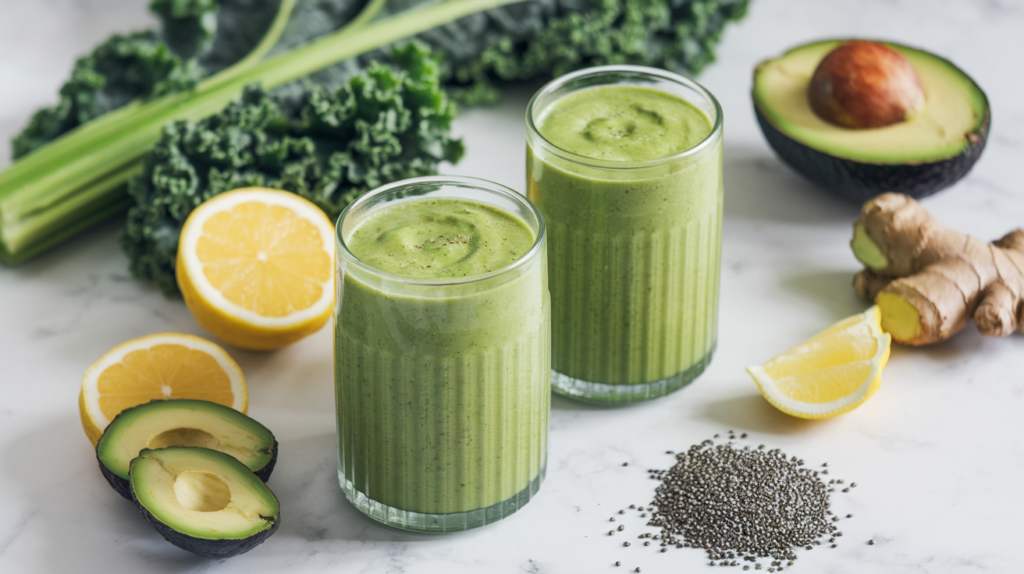
1. Selecting the Best Alkaline Nuts and Seeds
- Choose raw, unsalted nuts and seeds for maximum health benefits.
- Opt for organic and non-GMO plant-based proteins to avoid harmful additives.
2. Storing Alkaline Foods for Maximum Freshness
- Keep nuts and seeds in airtight containers to prevent spoilage.
- Store plant-based protein powders in a cool, dry place to maintain freshness.
3. Easy Meal Prep Ideas for an Alkaline Diet
- Pre-soak nuts and seeds to improve digestion.
- Cook a large batch of lentils or chickpeas for easy meal prep throughout the week.
4. Balancing Flavors
- Pair nuts and seeds with fruits or vegetables to balance their natural richness.
- Add a squeeze of lemon or lime to plant-based proteins for a zesty flavor.
FAQs About Alkaline Nuts, Seeds, and Plant-Based Proteins
Common Questions About Nuts, Seeds, and Plant-Based Proteins in an Alkaline Diet :
1. What are alkaline nuts, seeds, and plant-based proteins?
Alkaline nuts, seeds, and plant-based proteins are foods that help balance the body’s pH levels by neutralizing acidity. Examples include almonds, chia seeds, flaxseeds, lentils, and tofu.
2. Why are these foods important for an alkaline diet?
These foods are nutrient-dense, providing essential vitamins, minerals, and healthy fats while supporting digestion, reducing inflammation, and boosting energy—all key components of a balanced, alkaline diet.
3. Are all nuts and seeds alkaline?
Not all nuts and seeds are alkaline. For instance, almonds and chia seeds are more alkaline, while peanuts and walnuts are slightly more acidic.
4. Can plant-based proteins replace meat in my diet?
Yes, plant-based proteins like lentils, chickpeas, and tofu can be excellent alternatives to meat. They provide high-quality protein, fiber, and essential nutrients without the acidity associated with animal products.
5. How much of these foods should I eat daily?
Moderation is key. Aim for a handful of nuts or seeds daily (about 1 ounce) and 1–2 servings of plant-based proteins like lentils or tofu per meal, depending on your dietary needs.
6. Are roasted nuts and seeds still alkaline?
Roasting can slightly alter the pH of nuts and seeds, but lightly roasted or dry-roasted varieties are still nutritious. Opt for raw or minimally processed options for maximum alkalinity.
7. Are there allergens to consider in these foods?
Yes, some people may be allergic to nuts, seeds, or soy-based products like tofu. Always check for individual allergies before adding these foods to your diet.
8. What are some quick ways to incorporate these foods into meals?
- Add chia or flaxseeds to smoothies or oatmeal.
- Use lentils or chickpeas in soups and salads.
- Snack on raw almonds or roasted pumpkin seeds.
- Include tofu in stir-fries or curries.
9. Do alkaline nuts and seeds support weight loss?
Yes, their high fiber content and healthy fats promote satiety, helping you feel full longer and reducing overeating.
10. Can children eat alkaline nuts, seeds, and plant-based proteins?
Absolutely! These foods are highly nutritious and suitable for children, supporting growth, immunity, and overall health. Just ensure no allergies are present.
Conclusion
Alkaline nuts, seeds, and plant-based proteins are more than just dietary staples—they’re essential for a balanced, nutrient-rich lifestyle. By incorporating foods like almonds, chia seeds, and lentils into your meals, you can improve digestion, boost energy, and support overall wellness.
Ready to get started? Explore recipes like chia seed pudding, lentil soup, or quinoa bowls to experience the benefits of alkaline eating firsthand. For more inspiration, visit Fabilous Taste and start transforming your diet today!

